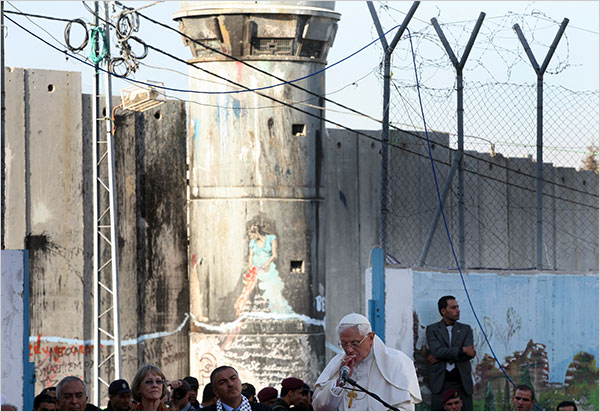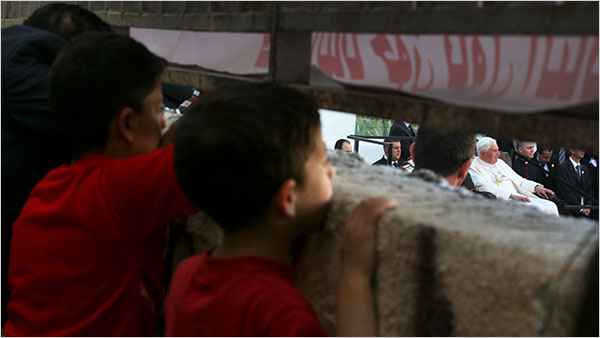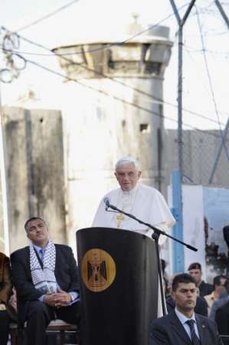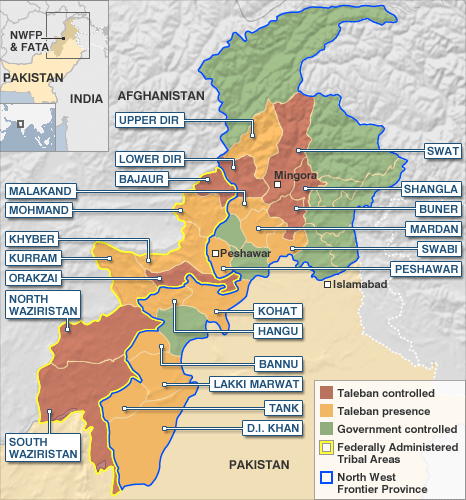Lebanon’s intelligence war with Israel
Israel’s ability to wage another war against the militant Shia movement Hezbollah may have been compromised by an unprecedented wave of arrests of people in Lebanon alleged to have been spying for the Israelis.
Experts say the arrests appear to add up to a major strategic blow to Israel.
Mobile phone footage circulating in Beirut shows one of the suspected agents being slapped and insulted as he was manhandled out of his house and into the boot of a car.
Lebanese newspapers have reported that more than 40 members of more than a dozen spy networks have been detained so far in a campaign that has gathered pace over the past six weeks, and shows no sign of stopping. [continued…]
Editor’s Comment — In the next couple of weeks, the Obama administration is likely to face the same Middle East challenge that proved too great for the Bush administration: demonstrating that its support for democracy is more than an empty slogan. At issue is whether Washington can respect the choice of Lebanese voters if Hezbollah ends up leading a coalition government. And, if Iranian voters favor reformist Mir Hossein Mousavi over the Israelis favorite nemesis, Mahmoud Ahmadinejad, can the administration respond appropriately and thus defuse Netanyahu’s ticking time bomb?
In this context, the fact that Israel has suffered a strategic setback in what might have been its chosen combat ground through which it could incite a pretext for a direct attack on Iran, is highly significant.
Israel is rapidly running out of excuses for avoiding dealing with the core political issue that will determine the Jewish state’s viability: whether it can accept a just resolution to the 60-year old Arab-Israeli conflict.
Obama’s bold settlements unsettledness
Freezing settlements is seen in Washington as critical to kick-starting an Arab-Israeli negotiating process; but any negotiations that hope to succeed will have to tackle the much more difficult issue of the status and rights of the Palestinian refugees. The danger is that so much political muscle and negotiating time will be expended on achieving a settlement freeze that prospects for getting the concessions needed on the refugees issue will lessen significantly.
Israel’s strategy is to make it seem that its concessions on settlements are so huge that the Palestinians have to make counter-concessions on the refugee issue. The trade-off Israel seeks is to drop its right to expand settlements in return for the Palestinians dropping their demand to offer the refugees a full range of options in a permanent peace accord, including the right of return for some refugees to their original homes and lands in Israel today. This is a dangerous approach because it equates Israeli settlements – an illegal, criminal act that is widely condemned by the entire world – with the legitimate rights of the refugees, which are widely recognized in law and many United Nations resolutions. [continued…]
Israel to U.S.: ‘Stop favoring Palestinians’
Tensions between Washington and Jerusalem are growing after the U.S. administration’s demand that Israel completely freeze construction in all West Bank settlements. Israeli political officials expressed disappointment after Tuesday’s round of meetings in London with George Mitchell, U.S. President Barack Obama’s envoy to the Middle East.
“We’re disappointed,” said one senior official. “All of the understandings reached during the [George W.] Bush administration are worth nothing.” Another official said the U.S. administration is refusing every Israeli attempt to reach new agreements on settlement construction. “The United States is taking a line of granting concessions to the Palestinians that is not fair toward Israel,” he said. [continued…]
Editor’s Comment — The US-Israeli tussle over freezing settlements makes for good political theater. Obama gets to look tough. The Israelis can wallow in the histrionics of making yet another heart-wrenching “major concession” and yet in this display that the press is so enthusiastically lapping up, little if anything is being noted about the fact that freezing settlements is not in fact a major concession.
It’s not a minor concession. It’s not even the most miserly of concessions. If it happens it will be nothing more nor less than a demonstration that Israel has a good faith intention to facilitate rather than obstruct the creation of a Palestinian state. In other words, right now it is a test to see whether after all these years Israel can finally demonstrate that its word is not worthless. If it passes the test, it’s allies can let out a small sigh of relief but it would be no occasion for the kind of congratulations that might mark a major step towards peace.
Obama offers olive branch of ‘respect’ to Middle East
President Barack Obama will offer his personal commitment to “change the conversation” with the Muslim world in a long-awaited speech in Cairo this week.
White House advisers vowed that Obama would “take on the tough issues”, including the Israeli-Palestinian conflict, and offer to bridge differences with Muslims based on “mutual interests and mutual respect” – the same words used in his address to the Turkish parliament last month.
Administration officials say privately that Obama has given himself two years for a diplomatic breakthough on a two-state solution for Israel and the Palestinians, despite the opposition of Binyamin Netanyahu, the Israeli prime minister, to America’s minimum demand for a freeze on all settlement building in disputed territory. [continued…]
Netanyahu: “What the hell do they want from me?”
Last night, shortly after U.S. Secretary of State Hillary Clinton told journalists that the Obama administration “wants to see a stop to settlements — not some settlements, not outposts, not natural growth exceptions,” Israeli Prime Minister Benjamin Netanyahu called a confidant. Referring to Clinton’s call for a settlement freeze, Netanyahu groused, “What the hell do they want from me?” according to his associate, who added, “I gathered that he heard some bad vibes in his meetings with [U.S.] congressional delegations this week.”
In the 10 days since Netanyahu and President Barack Obama held a meeting at the White House, the Obama administration has made clear in public and private meetings with Israeli officials that it intends to hold a firm line on Obama’s call to stop Israeli settlements. According to many observers in Washington and Israel, the Israeli prime minister, looking for loopholes and hidden agreements that have often existed in the past with Washington, has been flummoxed by an unusually united line that has come not just from Obama White House and the secretary of state, but also from pro-Israel congressmen and women who have come through Israel for meetings with him over Memorial Day recess. To Netanyahu’s dismay, Obama doesn’t appear to have a hidden policy. It is what he said it was.
“This is a sea change for Netanyahu,” a former senior Clinton administration official who worked on Middle East issues said. The official said that the basis of the Obama White House’s resolve is the conviction that it is in the United States’ as well as Israel’s interest to end the Israeli-Palestinian conflict. “We have significant, existential threats that Israel faces from Iran and that the U.S. faces from this region. It is in our mutual interest to end this conflict, and to begin to build new regional alliances.” [continued…]
Threat of the ‘thought police’ alarms Israel’s Arab minority
Israeli Arab leaders have called an emergency meeting today to discuss their growing alarm over a series of “racist and fascist” bills being promoted by right-wing members of the country’s parliament. One of the bills has already brought fierce accusations from two prominent Jewish Knesset members that its backers are trying to create a “thought police” and “punish people for talking”.
The Higher Arab Monitoring Committee – the main umbrella body of Arab political and civic leaders in Israel – cited special concern over another bill which would outlaw the commemoration of the Nakba or catastrophe on Israel’s Independence Day. While Israel’s Declaration of Independence on 14 May 1948 is celebrated annually as the foundation of the state, Palestinians in Israel, Gaza, the West Bank and in refugee camps abroad mark the expulsion and flight of some 700,000 Arabs during the war of that year.
But the Committee is also protesting at another bill, which was given its first reading in the Knesset this week, that would make it a crime to negate Israel’s right to exist as a “Jewish and democratic state”. [continued…]
… the fact that Mousavi is mounting a strong challenge illustrates the political ferment in Iran. Westerners often imagine that country as an Islamic boot camp with everyone marching in lock step, but there’s a surprisingly open debate in the Iranian media. Mousavi’s supporters have loudly criticized Ahmadinejad for Iran’s rising unemployment and inflation and for its growing international isolation.
Mousavi argued in a speech a week ago in Isfahan that Ahmadinejad’s fulminations are “disgracing” Iran. “The president . . . jeopardized the stature of the Iranian nation with thoughtless policies,” Mousavi said, referring to his rival’s anti-Israel diatribe at the United Nations conference on racism in Geneva in April. All Iranians share in the country’s prestige, he explained, and Ahmadinejad’s administration “undermines that prestige,” according to Xinhua.
Ahmadinejad’s supporters seem to be getting nervous. They burned Mousavi election banners at a rally in Isfahan on Wednesday and used tear gas to break up a Mousavi rally in the city of Malard two weeks ago, according to Iranian news reports. These are isolated incidents, but they demonstrate Ahmadinejad’s ability to use intimidating tactics as Election Day nears. [continued…]
Iran president’s rivals slam his foreign policy
In a political race most analysts predicted would hinge on domestic bread-and-butter issues, foreign policy has emerged as a major battleground — and a potential Achilles’ heel for Iranian President Mahmoud Ahmadinejad.
With campaigns for the June 12 presidential election in full swing, none of the three challengers have shied away from publicly criticizing Ahmadinejad on topics long considered off-limits for debate in Iran, such as his stance on the country’s nuclear program and his vitriol for Israel. [continued…]
Iran reformist candidate wants end of US sanctions
The leading reformist challenger to Mahmoud Ahmadinejad in the Iranian presidential race said Friday his country’s ties with the U.S. could improve if Washington were to halt economic sanctions against Iran.
A suspension of the U.S. sanctions imposed since 1995 would be a “positive sign” and inspire optimism, Mir Hossein Mousavi said at a press conference in Tehran. [continued…]
Pakistan army claims control of main Swat town
Pakistan’s military said Saturday that it had taken full control of Mingora, the most populous city in the Swat Valley, scoring a significant victory against Taliban forces three weeks after the start of an offensive in the area.
Maj. Gen. Athar Abbas, a military spokesman, said at a news conference that the army was able to flush out militants, in part with the help of locals who showed soldiers Taliban hiding places in hotels and other buildings. The military estimates it has killed more than 1,000 militants since the campaign began on May 8. [continued…]
Pakistani cities are new battleground for Taliban
Only a week ago, the military said it was expecting a long, hard-fought battle with Pakistani Taliban militants who had fortified themselves in the city’s hotels and buildings. It now appears that, after initially putting up stiff resistance, many militants chose to flee.
“When they realized that they were being encircled and the noose was tightening, they decided not to give a pitched battle,” Abbas said.
But the militants may have decided to fight another way: seeding fear in other parts of the country through well-coordinated bombing attacks. [continued…]
Amateurs use Google Earth to uncover Kim’s sinister secrets
For all the billions of dollars worth of surveillance technology directed at North Korea as it breathes fire this weekend, its closed society is so impervious to spying that diplomats in Asia are forced to admit that they might as well rely on Google Earth.
A set of images – “North Korea Uncovered”, released by Curtis Melvin, a keen American amateur – includes a tantalising view of the site where the North Koreans detonated a nuclear device last week that diplomatic sources say may have been based on a Chinese design.
Melvin’s satellite map of the country, collated from Google Earth, reveals palaces, labour camps, mass graves and the entrance to the subterranean test base in the remote northeast of the country. [continued…]
Who is to blame for the next attack?
After watching the farce surrounding Dick Cheney’s coming-out party this month, you have to wonder: Which will reach Washington first, change or the terrorists? If change doesn’t arrive soon, terrorists may well rush in where the capital’s fools now tread.
The Beltway antics that greeted the great Cheney-Obama torture debate were an unsettling return to the post-9/11 dynamic that landed America in Iraq. Once again Cheney and his cohort were using lies and fear to try to gain political advantage — this time to rewrite history and escape accountability for the failed Bush presidency rather than to drum up a new war. Once again Democrats in Congress were cowed. And once again too much of the so-called liberal news media parroted the right’s scare tactics, putting America’s real security interests at risk by failing to challenge any Washington politician carrying a big stick.
Cheney’s “no middle ground” speech on torture at the American Enterprise Institute arrived with the kind of orchestrated media campaign that he, his boss and Karl Rove patented in the good old days. It was bookended by a pair of Republican attack ads on the Web that crosscut President Obama’s planned closure of the Guantánamo Bay detention center with apocalyptic imagery — graphic video of the burning twin towers in one ad, a roar of nuclear holocaust (borrowed from the L.B.J. “daisy” ad of 1964) in the other. [continued…]
The trauma of 9/11 is no excuse
Top officials from the Bush administration have hit upon a revealing new theme as they retrospectively justify their national security policies. Call it the White House 9/11 trauma defense.
“Unless you were there, in a position of responsibility after September 11, you cannot possibly imagine the dilemmas that you faced in trying to protect Americans,” Condoleezza Rice said last month as she admonished a Stanford University student who questioned the Bush-era interrogation program. And in his May 21 speech on national security, Dick Cheney called the morning of Sept. 11, 2001, a “defining” experience that “caused everyone to take a serious second look” at the threats to America. Critics of the administration have become more intense as memories of the attacks have faded, he argued. “Part of our responsibility, as we saw it,” Cheney said, “was not to forget the terrible harm that had been done to America.”
I remember that morning, too. Shortly after the second World Trade Center tower was hit, I burst in on Rice (then the president’s national security adviser) and Cheney in the vice president’s office and remember glimpsing horror on his face. Once in the bomb shelter, Cheney assembled his team while the crisis managers on the National Security Council staff coordinated the government response by video conference from the Situation Room. Many of us thought that we might not leave the White House alive. I remember the next day, too, when smoke still rose from the Pentagon as I sat in my office in the White House compound, a gas mask on my desk. The streets of Washington were empty, except for the armored vehicles, and the skies were clear, except for the F-15s on patrol. Every scene from those days is seared into my memory. I understand how it was a defining moment for Cheney, as it was for so many Americans. [continued…]


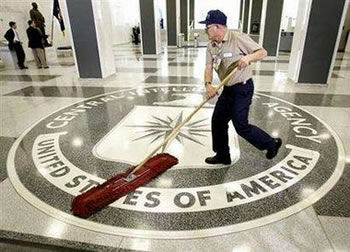 veryone’s afraid of the CIA.
veryone’s afraid of the CIA.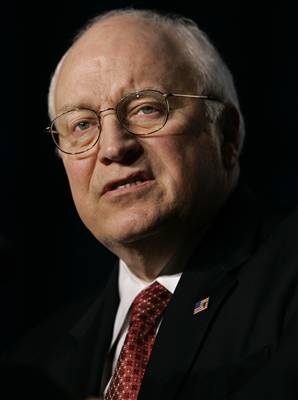 y investigations have revealed to me — vividly and clearly — that once the Abu Ghraib photographs were made public in the Spring of 2004, the CIA, its contractors, and everyone else involved in administering “the Cheney methods of interrogation”, simply shut down. Nada. Nothing. No torture or harsh techniques were employed by any U.S. interrogator. Period. People were too frightened by what might happen to them if they continued.
y investigations have revealed to me — vividly and clearly — that once the Abu Ghraib photographs were made public in the Spring of 2004, the CIA, its contractors, and everyone else involved in administering “the Cheney methods of interrogation”, simply shut down. Nada. Nothing. No torture or harsh techniques were employed by any U.S. interrogator. Period. People were too frightened by what might happen to them if they continued.